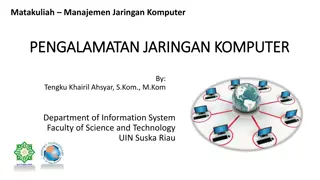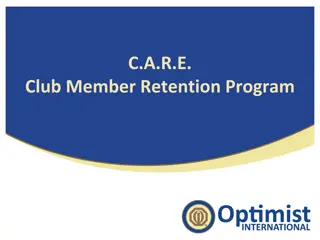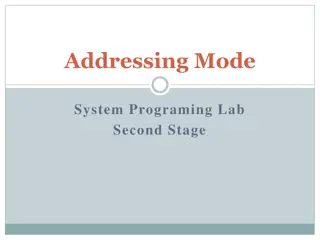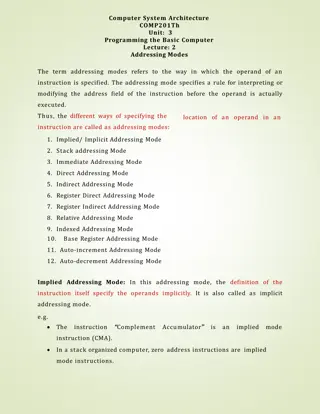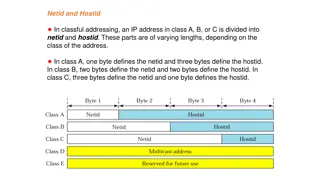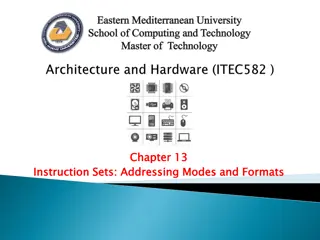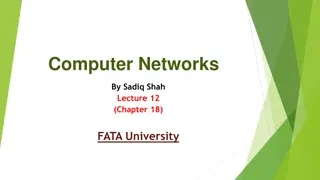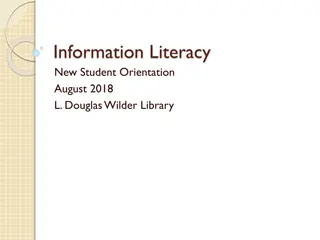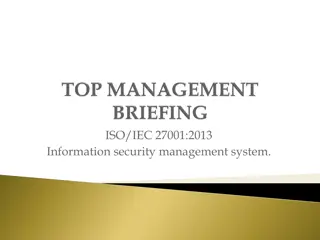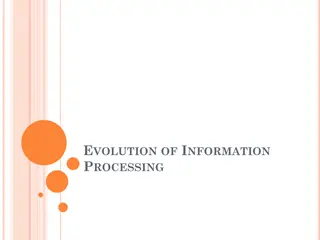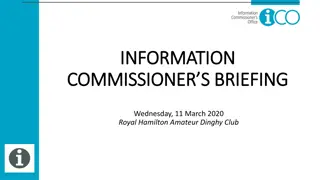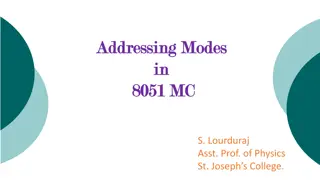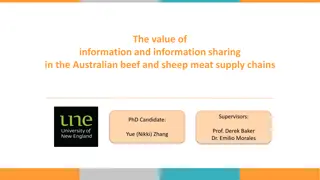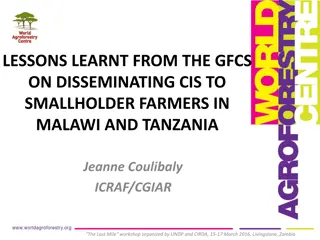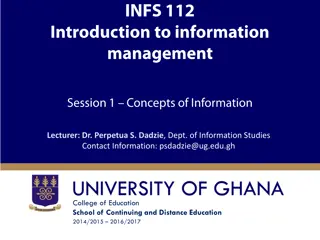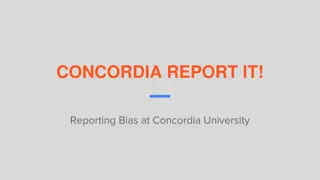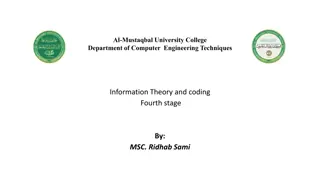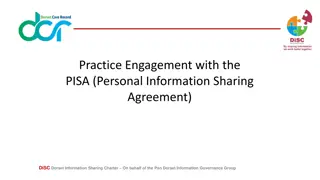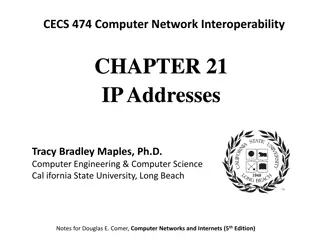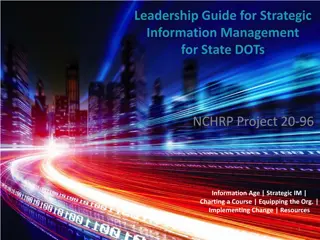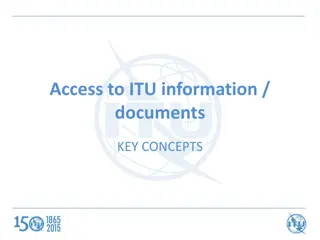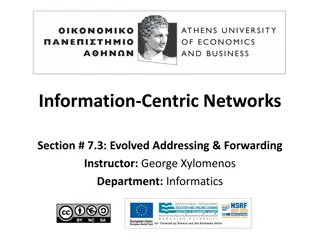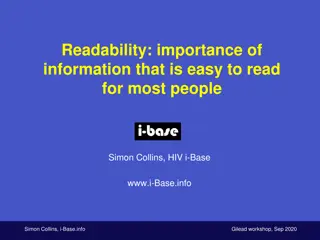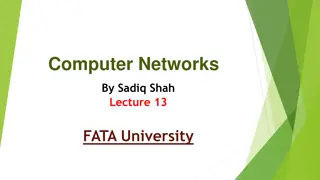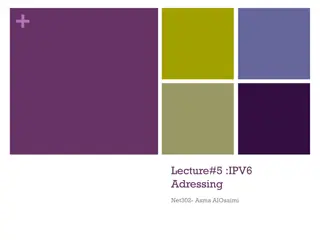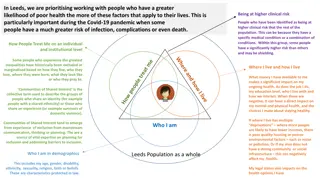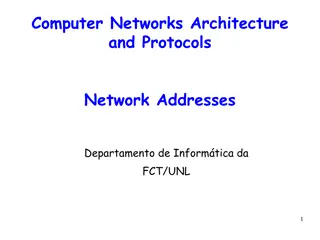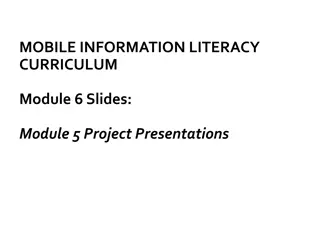Understanding Computer Network Addressing
Every computer connected to a network has a unique logical address for communication, typically identified using TCP/IP protocol. IP addressing includes Public and Private IPs, Static and Dynamic IPs, and is categorized into IPv4 and IPv6 versions. This study material elaborates on the terminologies
2 views • 28 slides
C.A.R.E.Club Member Retention Program
Implementing a structured C.A.R.E. Club Member Retention Program can help in addressing issues, recognizing accomplishments, celebrating contributions, and excelling together as a club. The program involves steps like addressing feedback openly, recognizing members for their efforts, and planning fo
6 views • 22 slides
Understanding Data Addressing Modes in System Programming
Introduction to fundamental data types in Intel architecture including bytes, words, double words, and quad words. Explanation of specifying an offset in memory with examples of instruction descriptions. Overview of data addressing modes such as register addressing and immediate addressing in system
1 views • 15 slides
Understanding Information Centres: Types and Organization
Modern libraries are evolving into information centres, offering precise information to users. They bridge the gap between user needs and available information. Information centres play a crucial role in providing timely and relevant information, aiding in decision-making and preventing duplication
0 views • 28 slides
Understanding Addressing Modes in Computer System Architecture
Addressing modes determine how the operand in an instruction is specified, impacting the interpretation and execution. Implied, stack, immediate, direct, indirect, register direct, register indirect, relative, indexed, base register, auto-increment, and auto-decrement are various addressing modes ex
0 views • 4 slides
Understanding Netid and Hostid in Classful IP Addressing
In classful IP addressing, IP addresses in Class A, B, or C are divided into netid and hostid parts with varying lengths based on the class. Each class has a fixed number of blocks, causing issues with classful addressing. Network addresses play a crucial role, defining organization networks and fac
0 views • 14 slides
Addressing Modes and Formats in Instruction Sets
This material discusses addressing modes and formats in instruction sets, covering types of addressing modes, design trade-offs, and the distinction between machine language and assembly language. It explores the need for various addressing techniques to reference locations in memory and presents co
1 views • 58 slides
Understanding IPv4 Addresses and Classful Addressing in Computer Networks
Explore the basics of IPv4 addresses, address space, hierarchy in addressing, and classful addressing in computer networks. Learn about the unique 32-bit structure of IPv4 addresses, address space calculation, notation methods, and the hierarchical nature of network addressing. Dive into the concept
2 views • 14 slides
Understanding Information Literacy: A Comprehensive Guide for Students
Information literacy is crucial for academic success. It involves the ability to recognize the need for information, locate relevant sources, evaluate their credibility, and effectively use the information for research and presentations. Primary and secondary sources play a vital role in gathering i
0 views • 19 slides
Understanding ISO/IEC 27001:2013 Information Security Management System
Overview of ISO/IEC 27001:2013 standard for information security management system (ISMS). Learn about the importance of protecting information assets, preserving confidentiality, integrity, and availability of information, and steps to certification. Enhance understanding of different types of info
0 views • 35 slides
Evolution of Information Processing in Computerization
Evolution of information processing from raw data to useful information through computerization. Data is collected, processed, and converted into valuable insights for decision-making. The growth of complexity led to the development of Information Technology, enabling efficient creation, processing,
0 views • 7 slides
Information Commissioner's Role in Bermuda's Public Access to Information
The Information Commissioner in Bermuda plays a crucial role in promoting public access to information, ensuring compliance with the PATI Act, and safeguarding the right to access public information. This independent office provides guidance to public authorities, oversees enforcement activities, an
0 views • 37 slides
Understanding Addressing Modes in 8051 Microcontroller
Addressing modes in the 8051 microcontroller play a crucial role in specifying how data is accessed and operated by instructions. They include register addressing, direct addressing, register indirect addressing, immediate addressing, and indexed addressing modes. Each mode offers unique ways to han
2 views • 20 slides
Understanding Addressing Modes in 8086
Delve into the world of addressing modes in the 8086 processor to comprehend how different types of operands are accessed and utilized during instruction execution. Explore immediate, direct, register, register-indirect, and other addressing modes with detailed examples.
1 views • 17 slides
Enhancing Information Sharing in Australian Meat Supply Chains
This research delves into the value of information and information sharing within the beef and sheep meat supply chains in Australia. It explores the benefits of improved decision-making, reduced costs, and enhanced supply chain performance through strategic information sharing. The study also ident
1 views • 21 slides
Discussion on Provisioning Servers Addressing Information in 3GPP TS 23.501
Background CT4 LS in S2-2200200 issue 2 discussed the interpretation and intention of the addressing information for Provisioning Servers (PVS) as stated in 3GPP TS 23.501. The focus was on whether the provided PVS IP addresses and/or FQDNs are for a single PVS server or multiple servers and how the
0 views • 4 slides
Understanding Byte, Endianness, and Memory Addressing in Computer Systems
Delve into the intricacies of bytes, endianness, and memory addressing in computer systems through information on gdbserver installation, binary representation, ASCII encoding, byte sizes, and memory address allocation. Explore the fundamentals of data representation and manipulation to enhance your
0 views • 47 slides
Avoco's Cloud-Based Information Card Selector: Enhancing Usability and Security
Avoco's Cloud-Based Information Card Selector is a leap forward in Information Card usability, offering benefits such as universal access to Information Cards, zero footprint for end users, and enhanced security features. The platform allows for easy creation, import, and backup of cards, as well as
0 views • 29 slides
Addressing Challenges Faced by Archbishop Simon Poh in Kuching, Malaysia
Archbishop Simon Poh of Archdiocese of Kuching, Sarawak, Malaysia discusses the challenges and crisis faced, particularly in safeguarding youth against abuse. He emphasizes the need for proactive measures in addressing sex abuse in Asia, highlighting the importance of protecting children. Archbishop
0 views • 25 slides
Enhancing Climate Information Dissemination to Smallholder Farmers in Malawi and Tanzania
Lessons learned from the Global Framework for Climate Services (GFCS) on disseminating Climate Information Services (CIS) to smallholder farmers in Malawi and Tanzania highlighted the importance of multi-stakeholder partnerships in improving access to climate information. The advantages include a ho
0 views • 14 slides
Exploring Restorative Justice in Addressing Campus Sexual Harm
Restorative justice offers an informal approach to addressing campus sexual harm by involving harmed parties, offenders, and others in a collaborative decision-making process. It focuses on holding responsible parties accountable, repairing harm, rebuilding trust, and addressing underlying issues th
0 views • 20 slides
Understanding Data, Information, and Knowledge in Information Studies
Data, information, and knowledge play vital roles in our lives and are essential in information studies. Dr. Perpetua Dadzie explores the definitions and distinctions among data, information, and knowledge, emphasizing the transformation process that turns raw data into meaningful information. The s
0 views • 23 slides
Understanding the Role of Classified Information in Criminal Trials
In criminal trials, the handling of classified information is crucial and governed by specific rules. Defendants do not have an inherent right to access classified information, and there are procedures in place to determine its use in court. The rights surrounding secret evidence include protection
0 views • 43 slides
Addressing Bias-Related Incidents at Concordia University
The report discusses bias reporting at Concordia University, highlighting the importance of understanding and addressing bias-related incidents. It covers examples of bias, distinction between bias incidents and hate crimes, and strategies for response. Presenters from the Office of Multicultural En
0 views • 11 slides
Development of UN-IGIF Action Plan in Cameroon: Addressing Geospatial Data Governance Challenges
The journey of developing a UN-IGIF Action Plan at the country level in Cameroon begins with identifying stakeholders and common strategic priorities, mobilizing support, setting up project teams, drafting action plans, and organizing workshops. The lack of coordination among geospatial information
0 views • 4 slides
Understanding Information Entropy in Information Theory
Information entropy, a key concept in information theory, measures the average amount of information in a message. Source entropy and binary source entropy are explained with examples, along with maximum source entropy for both binary and non-binary sources. Learn how to calculate entropy for differ
0 views • 12 slides
Enhancing Information Sharing: DISC and PISA Benefits
DISC (Dorset Information Sharing Charter) and PISA (Personal Information Sharing Agreement) facilitate improved information sharing among healthcare organizations in Dorset. DISC establishes robust principles for managing data flow and promoting best practices in information governance, while PISA t
0 views • 8 slides
Understanding IP Addressing in Computer Networks
IP addressing provides a seamless network for users by abstracting and providing a uniform addressing scheme used by higher-layer protocols and applications. IP addresses identify connections rather than specific computers, with IPv4 using 32-bit integers and IPv6 using 128-bit addresses. The divisi
0 views • 19 slides
Leadership Guide for Strategic Information Management in State DOTs
This guide provides insights into maximizing the value of available information, enhancing efficiency in information collection and use, and improving organizational readiness. It addresses the evolving role of transportation agencies as facilitators of information and the significance of informatio
0 views • 27 slides
Understanding Access to ITU Information and Documents
Exploring the concept of access in the work of a dedicated group, this content delves into the types of information that could or should be made available to the public, along with considerations on when access should be provided. It highlights the varying stages of information dissemination, discus
0 views • 8 slides
Evolved Addressing and Forwarding in Information-Centric Networks
The content discusses Evolved Addressing and Forwarding in Information-Centric Networks, focusing on an accountable Internet protocol (AIP) that addresses vulnerabilities at the IP level, such as source spoofing, DoS attacks, and route hijacking. AIP utilizes a hierarchy of self-certifying addresses
0 views • 16 slides
Importance of Readable Patient Information in Healthcare
Patient information plays a crucial role in healthcare, but the readability of this information is often overlooked. Simon Collins discusses how difficult text can create barriers to accessing healthcare and the importance of making patient information easy to understand. The talk emphasizes the nee
0 views • 37 slides
Understanding Addressing in Computer Networks
Addressing in computer networks plays a crucial role in efficient communication. Classful addressing, which led to address depletion, has made way for classless addressing and CIDR strategy. In classless addressing, the address space is divided into variable length blocks, allowing for more flexibil
0 views • 17 slides
IPv6 Addressing and Coexistence: Overview and Challenges
This lecture covers essential topics on IPv6 addressing, including IPv4 issues, the need for IPv6, address representation, types, testing, and verification. It explains how IPv6 is designed to overcome the limitations of IPv4, particularly the depletion of the IPv4 address space. The discussion also
0 views • 44 slides
Understanding Health Inequalities and Communities of Shared Interest in Leeds
In Leeds, a focus is placed on addressing health inequalities by working with individuals who are at higher risk due to various factors impacting their lives. These factors include medical conditions, socioeconomic status, living conditions, and more, which can greatly influence overall health outco
0 views • 4 slides
Understanding IP Addressing and Routing in Computer Networks
IP (Internet Protocol) operates at Layer 3 of the OSI model and TCP/IP stack, facilitating the routing of data packets over computer networks. It is a connectionless protocol that uses hierarchical addressing to efficiently route packets to their destinations. IP addressing, such as the 32-bit IPv4
0 views • 39 slides
Understanding Network Addresses and IP Addressing Schemes
Exploring the concept of network addresses, IP address allocation, prefixes, and packet forwarding in computer networks. Addressing requirements, the simplest solutions, IPv4 addressing, Ethernet frames, and hierarchical IP addressing schemes are covered in detail.
0 views • 25 slides
Understanding IP Addressing in Networking
IP addressing plays a crucial role in providing unique addresses to machines on the internet, identifying networks and hosts, enabling routing, and ensuring proper packet delivery across networks. This content covers the need for IP addresses, their role in routing, address parts, classful IP addres
0 views • 36 slides
Importance of Information Protection and Security Measures
Enhance understanding of information and information security, different types of information assets, classification of internal and confidential information, types of data, information life cycle, and potential risks if information is not well-protected.
0 views • 25 slides
Mobile Information Literacy Curriculum Overview
The Mobile Information Literacy Curriculum focuses on equipping individuals with essential skills to navigate the digital world effectively through mobile devices. It covers topics such as web searching, online work, information evaluation, and project presentations. The curriculum aims to bridge th
0 views • 8 slides
